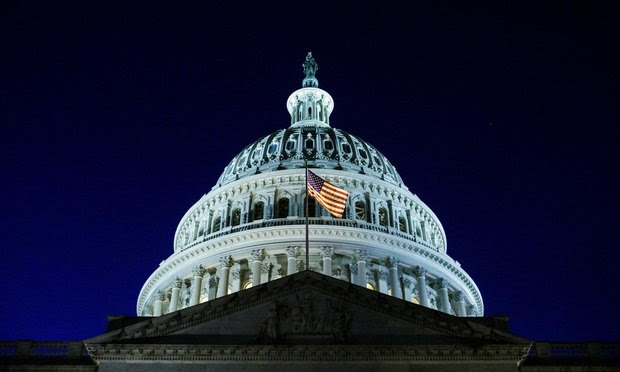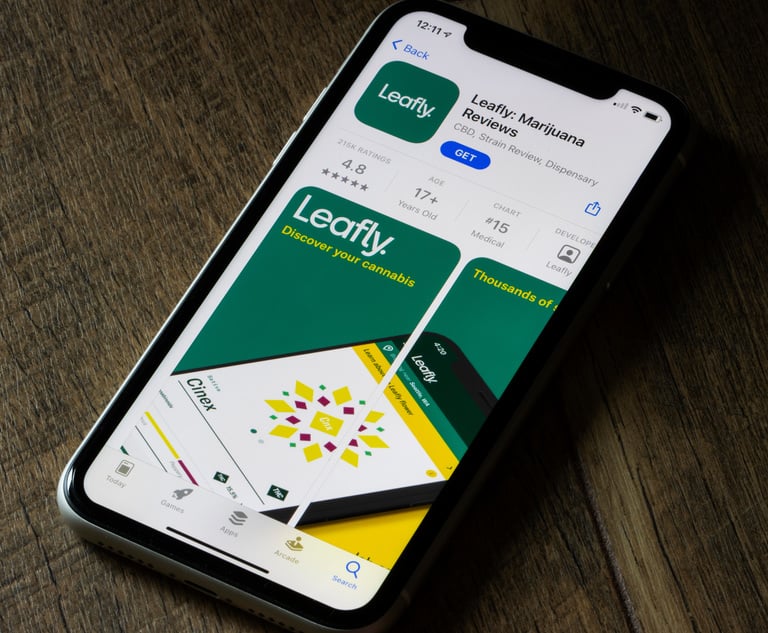Higher Law: Q&A: Dykema's Andrew Scott on Illinois Scene | NY Recreational in 2020? | FDA Dampens CBD Buzz | Who Got the Work
Welcome to Higher Law! Check out our interview with Dykema's Andrew Scott on what's happening in Illinois, and scroll down for headlines, Who Got the Work and much more. Thanks, always, for reading! And please keep sending me your feedback.
January 09, 2020 at 04:00 PM
9 minute read
Welcome back to Higher Law, our weekly briefing on all things cannabis. I'm Cheryl Miller, reporting for Law.com from Sacramento.
This week: Dykema's Andrew Scott talks with us about what's going on in Illinois, and what's on his plate. Plus: there's a new class action in EDNY, and an M&A-related complaint's unfolding in Arizona. Scroll down for headlines and more.
Thanks for jumping into the third year of Higher Law with us. I count on your feedback, tips, story ideas and colorful anecdotes to keep this going. So please, keep them all coming at [email protected]. Or call me at 916.448.2935. Follow me on Twitter @capitalaccounts. 
Q&A: Dykema's Andrew Scott on the Illinois Scene
The recreational marijuana market launched in Illinois on Jan. 1 with a crush of sales. The state reported that more than $11 million in legal weed had been sold in the first six days. That booming business has been accompanied by a few snags. I recently spoke with Andrew Scott, a partner in Dykema's Chicago office about what's happening in the Prairie State. Here are excerpts of our conversation edited for length and clarity.
Higher Law: What are you hearing and seeing as the recreational marijuana market takes off?
Andrew Scott: We have very, very long lines and we have some places shutting down for a little while to give their employees a break just because they don't have enough employees qualified with the state. And in some instances I'm hearing that there are shortages of supply.
So it's both a shortage of qualified employees and supply?
Exactly. And the other really interesting thing I'm seeing is really high tax bills. Somebody sent me a receipt from a January 1 purchase and in rough numbers the total bill was $225 and about $75 to $80 of that was tax.
Have there been any regulatory hiccups?
 There was a big rush to get the legislation out. I think a lot of people were counting on the revenue from this, particularly at the state level, to plug some holes in the budget. And so maybe the legislation when it came out didn't have enough time to mature and sort of think some things through. But I think the state did a really, really good job sort of getting questions from prospective applicants and providing guidance and advisory language on how the thing was going to work.
There was a big rush to get the legislation out. I think a lot of people were counting on the revenue from this, particularly at the state level, to plug some holes in the budget. And so maybe the legislation when it came out didn't have enough time to mature and sort of think some things through. But I think the state did a really, really good job sort of getting questions from prospective applicants and providing guidance and advisory language on how the thing was going to work.
Anything else you're seeing?
One of the things I see that is particularly problematic is that you're not perfected in terms of your license until—you have to get your zoning approval—but you also have to get inspected by the state to make sure your facility for which you are licensed complies with your application.
Layered on top of that you also have sort of a 1,500-foot radius blackout. You're not allowed to have one dispensary within 1,500 feet of another. So you have scenarios where you have two applicants that have leased premises or property within 1,500 feet of each other and it almost becomes a race to the courthouse
It's a tremendous investment, so you have Applicant A, Applicant B. They spend, let's say, $250,000 between putting together their application and architects and all the stuff that goes into it. They spend several thousand dollars more building out their space. And if Applicant A and Applicant B are kind of neck and neck in that process somebody can be SOL because the state, let's just say, inspects Applicant B first, Applicant A is SOL. They can't open up within 1,500 feet of another.
That sounds like a recipe for litigation.
Well, I don't know about litigation, but I think any time you've got that kind of money involved, not only have you laid out a bunch but you've got the prospect of making a whole lot more with your dispensary. People don't like to lose money that way.
What's the biggest issue on your plate right now?
I think, particularly in the city of Chicago, because just the way we're divided into 50 wards, we have 50 alderman and neighborhoods with generally very engaged community groups. So you need to set up your community process because you don't want to go into a hearing without some level of support or at least having engaged the community.
And then the other challenge is there's a big so-called social equity component.to this, meaning the folks that have been most negatively affected by the war on drugs and particularly cannabis, giving them an opportunity to participate in the spoils of this particularly lucrative industry. And how do you best do that?
>> More reading: Chicago Mayor Lori Lightfoot's on-site recreational marijuana smoking rules for business stalls (Chicago Tribune

Who Got the Work
• Former Maryland marijuana regulator Joy Strand has joined Green Leaf Medical as an executive vice president, The Baltimore Sun reported. Strand left her role as executive director of the Maryland Medical Marijuana Commission in October. In her new role with Green Leaf, Strand will lead the company' s government relations efforts in multiple states.
• The Rosen Law Firm partners Philip Kim and Laurence Rosen filed a proposed class action in the Eastern District of New York targeting Trulieve Cannabis Corp. The suit alleges that Florida-based Trulieve deceived investors about its growing process and insider involvement in real estate sales, my colleague Jane Wester at Law.com reports. Read the complaint here.
• Paul Allen Conant of Conant & Associates in Phoenix, Arizona, is representing Harvest Health & Recreation Inc. in a lawsuit seeking to terminate its merger with Falcon International Inc. In a complaint filed in the U.S. District Court of Arizona, Harvest alleges that Falcon has not met terms of the merger agreement. Harvest is asking for the return of what the company says is $50 million in cash and in-kind advances made to Falcon.

In the Weeds…
>> Is 2020 finally the year for recreational marijuana in New York? In his State of the State address this week, Gov. Andrew Cuomo said he will pursue another legalization proposal as part of the annual budget. The governor's office said Cuomo's plan could generate $300 million a year in tax revenues. [New York Law Journal] The New York Times has more here.
>> The FDA rained on the CBD parade. "Big food-and-drink companies are slowing work on products containing cannabidiol after regulators sounded a note of caution, making space for smaller players to capture more of the budding market." [WSJ]
 >> Florida leaders are lining up against a proposed recreational measure. Lawyers for Attorney General Ashley Moody (at left), the state House of Representatives and the Senate have asked the Florida Supreme Court to keep a constitutional amendment allowing adult-use marijuana off the ballot. They argue the measure's language wouldn't fully inform voters that marijuana remains legal at the federal level. The measure, which would appear on the November ballot, would allow residents to possess up to 2.5 ounces of marijuana for personal use. [News Service of Florida]
>> Florida leaders are lining up against a proposed recreational measure. Lawyers for Attorney General Ashley Moody (at left), the state House of Representatives and the Senate have asked the Florida Supreme Court to keep a constitutional amendment allowing adult-use marijuana off the ballot. They argue the measure's language wouldn't fully inform voters that marijuana remains legal at the federal level. The measure, which would appear on the November ballot, would allow residents to possess up to 2.5 ounces of marijuana for personal use. [News Service of Florida]
>> Is South Dakota next? Forget New York and New Jersey. The Mount Rushmore State could be the next state to approve recreational marijuana. The secretary of state announced this week that a constitutional amendment that would legalize marijuana for adults had qualified for the November 2020 ballot. A separate measure to allow chronically ill patients to use medical marijuana already qualified for the same ballot. [AP]
>> And then there's Mississippi. State voters in November will consider a measure to allow prescribed marijuana use for designated medical conditions. Gov. Phil Bryant and other state leaders have announced their opposition to the initiative. [Clarion Ledger]
>> Is pot the cure for long-suffering Browns fans? Someone has petitioned the State Medical Board of Ohio to make being a Cleveland Browns or Cincinnati Bengals fan a qualifying medical condition for marijuana use. But don't count on regulators giving the green light to fans of the two often-mediocre teams. The medical board requires scientific evidence and support from the medical community for such a determination. [Cincinnati Enquirer]

Calendar Things for Your Calendar
Jan. 15 - A subcommittee of the U.S. House Energy and Commerce Committee hosts the hearing "Cannabis Policies for the New Decade." "We're particularly interested in examining the implications of changing marijuana's schedule listing, the potential of cannabis research, and federal efforts to review and approve cannabidiol products," committee chairman Frank Pallone Jr. and subcommittee chairwoman Anna Eshoo said in a prepared statement.
Jan. 15 - NJ Cannabis Insider hosts a business networking event in Red Bank, New Jersey. Fruqan Mouzon, chair of the cannabis practice group at McElroy, Deutsch, Mulvaney & Carpenter, is among the listed speakers.
Jan. 16 - The committee backing a recreational marijuana ballot measure in Florida is due to file a brief at the Florida Supreme Court defending the accuracy of the language from a legal challenge by the state attorney general and other state leaders.
This content has been archived. It is available through our partners, LexisNexis® and Bloomberg Law.
To view this content, please continue to their sites.
Not a Lexis Subscriber?
Subscribe Now
Not a Bloomberg Law Subscriber?
Subscribe Now
NOT FOR REPRINT
© 2025 ALM Global, LLC, All Rights Reserved. Request academic re-use from www.copyright.com. All other uses, submit a request to [email protected]. For more information visit Asset & Logo Licensing.
You Might Like
View All
NY Cannabis Marketing Rulings / Rescheduling Effects / Honigman's Work on Trademark Suit / Goodbye
9 minute read
Workplace Weed and Labor Pacts / State AGs and Hemp / Maryland Licensing Suit / Vicente Sues Recruiter
9 minute readLaw Firms Mentioned
Trending Stories
- 1States Accuse Trump of Thwarting Court's Funding Restoration Order
- 2Microsoft Becomes Latest Tech Company to Face Claims of Stealing Marketing Commissions From Influencers
- 3Coral Gables Attorney Busted for Stalking Lawyer
- 4Trump's DOJ Delays Releasing Jan. 6 FBI Agents List Under Consent Order
- 5Securities Report Says That 2024 Settlements Passed a Total of $5.2B
Who Got The Work
J. Brugh Lower of Gibbons has entered an appearance for industrial equipment supplier Devco Corporation in a pending trademark infringement lawsuit. The suit, accusing the defendant of selling knock-off Graco products, was filed Dec. 18 in New Jersey District Court by Rivkin Radler on behalf of Graco Inc. and Graco Minnesota. The case, assigned to U.S. District Judge Zahid N. Quraishi, is 3:24-cv-11294, Graco Inc. et al v. Devco Corporation.
Who Got The Work
Rebecca Maller-Stein and Kent A. Yalowitz of Arnold & Porter Kaye Scholer have entered their appearances for Hanaco Venture Capital and its executives, Lior Prosor and David Frankel, in a pending securities lawsuit. The action, filed on Dec. 24 in New York Southern District Court by Zell, Aron & Co. on behalf of Goldeneye Advisors, accuses the defendants of negligently and fraudulently managing the plaintiff's $1 million investment. The case, assigned to U.S. District Judge Vernon S. Broderick, is 1:24-cv-09918, Goldeneye Advisors, LLC v. Hanaco Venture Capital, Ltd. et al.
Who Got The Work
Attorneys from A&O Shearman has stepped in as defense counsel for Toronto-Dominion Bank and other defendants in a pending securities class action. The suit, filed Dec. 11 in New York Southern District Court by Bleichmar Fonti & Auld, accuses the defendants of concealing the bank's 'pervasive' deficiencies in regards to its compliance with the Bank Secrecy Act and the quality of its anti-money laundering controls. The case, assigned to U.S. District Judge Arun Subramanian, is 1:24-cv-09445, Gonzalez v. The Toronto-Dominion Bank et al.
Who Got The Work
Crown Castle International, a Pennsylvania company providing shared communications infrastructure, has turned to Luke D. Wolf of Gordon Rees Scully Mansukhani to fend off a pending breach-of-contract lawsuit. The court action, filed Nov. 25 in Michigan Eastern District Court by Hooper Hathaway PC on behalf of The Town Residences LLC, accuses Crown Castle of failing to transfer approximately $30,000 in utility payments from T-Mobile in breach of a roof-top lease and assignment agreement. The case, assigned to U.S. District Judge Susan K. Declercq, is 2:24-cv-13131, The Town Residences LLC v. T-Mobile US, Inc. et al.
Who Got The Work
Wilfred P. Coronato and Daniel M. Schwartz of McCarter & English have stepped in as defense counsel to Electrolux Home Products Inc. in a pending product liability lawsuit. The court action, filed Nov. 26 in New York Eastern District Court by Poulos Lopiccolo PC and Nagel Rice LLP on behalf of David Stern, alleges that the defendant's refrigerators’ drawers and shelving repeatedly break and fall apart within months after purchase. The case, assigned to U.S. District Judge Joan M. Azrack, is 2:24-cv-08204, Stern v. Electrolux Home Products, Inc.
Featured Firms
Law Offices of Gary Martin Hays & Associates, P.C.
(470) 294-1674
Law Offices of Mark E. Salomone
(857) 444-6468
Smith & Hassler
(713) 739-1250










